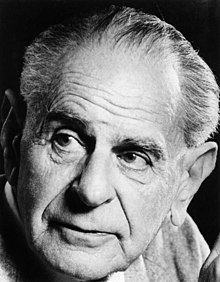
Back Karl Popper Afrikaans Karl Popper AN كارل بوبر Arabic كارل بوبر ARZ কাৰ্ল পপাৰ Assamese Karl Popper AST Karl Popper Azerbaijani کارل پوپر AZB Karl Popper BCL Карл Попер Byelorussian

Sir Karl Raimund Popper CH FRS FBA[4] (28 July 1902 – 17 September 1994) was an Austrian–British[5] philosopher, academic and social commentator.[6][7][8] One of the 20th century's most influential philosophers of science,[9][10][11] Popper is known for his rejection of the classical inductivist views on the scientific method in favour of empirical falsification. According to Popper, a theory in the empirical sciences can never be proven, but it can be falsified, meaning that it can (and should) be scrutinised with decisive experiments. Popper was opposed to the classical justificationist account of knowledge, which he replaced with critical rationalism, namely "the first non-justificational philosophy of criticism in the history of philosophy".[12]
In political discourse, he is known for his vigorous defence of liberal democracy and the principles of social criticism that he believed made a flourishing open society possible. His political thought resides within the camp of Enlightenment rationalism and humanism. He was a dogged opponent of totalitarianism, nationalism, fascism, romanticism, collectivism, and other kinds of (in Popper’s view) reactionary and irrational ideas, and identified modern liberal democracies as the best-to-date embodiment of an open society.[3]
- ^ IEP Critical rationalism.
- ^ a b Thornton 2015 : "Popper professes to be anti-conventionalist, and his commitment to the correspondence theory of truth places him firmly within the realist's camp".
- ^ a b IEP Popper political.
- ^ Miller 1997.
- ^ Adams, I.; Dyson, R. W. (2007). Fifty Major Political Thinkers. Routledge. p. 196. "He became a British citizen in 1945".
- ^ Watkins 1997.
- ^ Watkins 1994.
- ^ "Karl Popper (1902–94) advocated by Andrew Marr". BBC In Our Time – Greatest Philosopher. Retrieved January 2015.
- ^ Thornton 2015.
- ^ Horgan 1992.
- ^ IEP Popper scientific.
- ^ William W. Bartley (1964). "Rationality versus the Theory of Rationality". In Mario Bunge: The Critical Approach to Science and Philosophy (The Free Press of Glencoe). Section IX.

